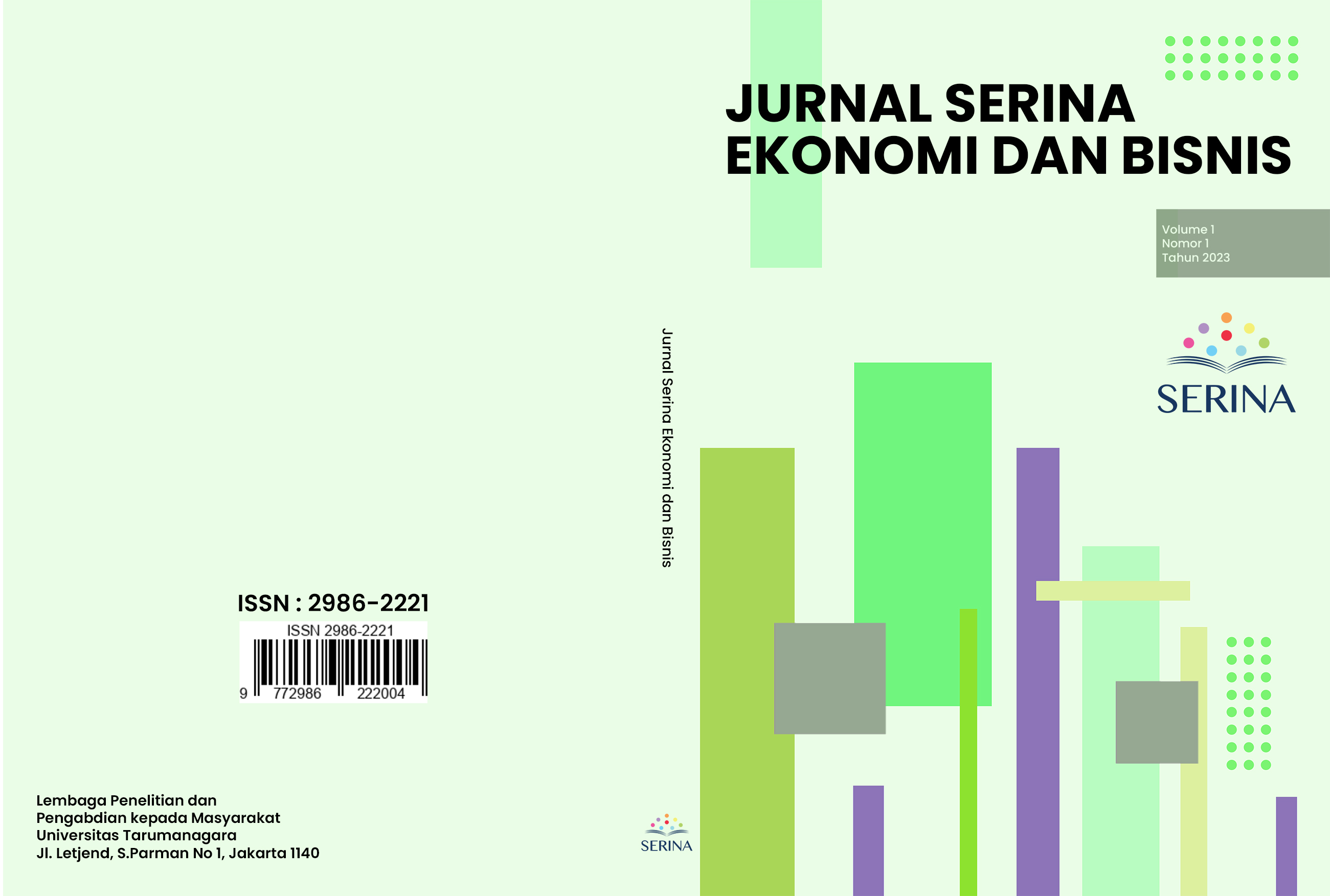HUBUNGAN ANTARA PENDIDIKAN KEWIRAUSAHAAN, EFIKASI DIRI KEWIRAUSAHAAN, DAN ENTREPRENEURIAL PASSION
Main Article Content
Abstract
Object of this research consists of the dependent variable namely entrepreneurial passion, the independent variable namely entrepreneurship education, and entrepreneurial self-efficacy as a mediating variable. The purpose of this research is to test empirically the effect of entrepreneurship education on entrepreneurial passion, to test empirically the effect of entrepreneurship education on entrepreneurial self-efficacy, to test empirically the effect of entrepreneurial self-efficacy on entrepreneurial passion, to test empirically the effect of entrepreneurial self-efficacy mediating entrepreneurship education on entrepreneurial passion in Tarumanagara University students. This research is a descriptive quantitative research. This study used a cross-sectional design study method. The sample selection technique used is non-probability sampling with purposive sampling technique. Results of discriminant validity (discriminant validity). Reliability testing in this study was measured through Cronbach's alpha and composite reliability. The conclusions obtained from this study include: 1) Entrepreneurial education has a positive and significant effect on entrepreneurial passion, 2) Entrepreneurial education has a positive and significant effect on entrepreneurial self-efficacy, 3) Entrepreneurial self-efficacy has a positive and significant effect on entrepreneurial passion, 4) Efficacy Entrepreneurial self positively and significantly mediates entrepreneurship education on entrepreneurial passion.
Objek penelitian ini terdiri dari variabel dependen yaitu entrepreneurial passion, variabel independen yaitu pendidikan kewirausahaan, dan efikasi diri kewirausahaan sebagai variabel mediasi. Tujuan dari penelitian ini adalah untuk menguji secara empiris pengaruh pendidikan kewirausahaan terhadap entrepreneurial passion, untuk menguji secara empiris pengaruh pendidikan kewirausahaan terhadap efikasi diri kewirausahaan, untuk menguji secara empiris pengaruh efikasi diri kewirausahaan terhadap entrepreneurial passion, untuk menguji secara empiris pengaruh efikasi diri kewirausahaan memediasi pendidikan kewirausahaan terhadap entrepreneurial passion pada mahasiswa Universitas Tarumanagara. Penelitian ini merupakan penelitian kuantitatif deskriptif. Penelitian ini menggunakan metode studi cross-sectional design. Teknik pemilihan sampel yang digunakan adalah non-probability sampling dengan teknik purposive sampling. Hasil validitas diskriminan (discriminant validity). Pengujian reliabilitas pada penelitian ini diukur melalui cronbach's alpha dan composite reliability. Kesimpulan yang diperoleh dari penelitian ini diantaranya adalah: (a) pendidikan kewirausahaan berpengaruh positif dan signifikan terhadap entrepreneurial passion; (b) pendidikan kewirausahaan berpengaruh positif dan signifikan terhadap efikasi diri kewirausahaan; (c) efikasi diri kewirausahaan berpengaruh positif dan signifikan terhadap entrepreneurial passion; (d) efikasi diri kewirausahaan secara positif dan signifikan memediasi pendidikan kewirausahaan terhadap entrepreneurial passion.
Article Details
Section

This work is licensed under a Creative Commons Attribution-NonCommercial-ShareAlike 4.0 International License.
References
Badan Pusat Statistik. (2020, November 5). Dampak Covid-19, Pengangguran DKI Jakarta Tembus Dua Digit. https://jakarta.bps.go.id/pressrelease/2020/11/05/493/dampak-covid-19--pengangguran-dki-jakarta-tembus-dua-digit.html
Badan Pusat Statistik. (2022, May 9). Tingkat Pengangguran Terbuka (TPT) sebesar 5,83 persen dan Rata-rata upah buruh sebesar 2,89 juta rupiah per bulan. Badan Pusat Statistik. https://www.bps.go.id/pressrelease/2022/05/09/1915/februari-2022--tingkat-pengangguran-terbuka--tpt--sebesar-5-83-persen.html
Ghozali, I. (2018). Aplikasi analisis multivariate dengan program IBM SPSS 25 edisi ke-9. http://slims.umn.ac.id//index.php?p=show_detail&id=19545
Gunawan, C. (2022). Pengaruh Entrepreneurship Education Dan Entrepreneurial Passion Terhadap Entrepreneurial Intention Melalui Entrepreneurial Self-Efficacy Sebagai Variabel Mediasi Pada Mahasiswa Tingkat Akhir Universitas Kristen Petra Surabaya, 12(1).
Hair, J. F., Ringle, C. M., & Sarstedt, M. (2011). PLS-SEM: Indeed a silver bullet. Journal of Marketing Theory and Practice, 19(2), 139–152. https://doi.org/10.2753/MTP1069-6679190202
Hair, J. F., Ringle, C. M., & Sarstedt, M. (2017). Partial least squares structural equation modeling with R. In Practical Assessment, Research and Evaluation, 21(1).
Hair, J. F., Ringle, C. M., & Sarstedt, M. (2020). Partial Least Squares Structural Equation Modeling. In Handbook of Market Research (Issue September). https://doi.org/10.1007/978-3-319-05542-8
Hair, J. F., Risher, J. J., Sarstedt, M., & Ringle, C. M. (2019). The Results of PLS-SEM Article information. European Business Review, 31(1), 2–24.
Henseler, J., Ringle, C. M., & Sinkovics, R. R. (2009). The use of partial least squares path modeling in international marketing. Advances in International Marketing, 20, 277–319. https://doi.org/10.1108/S1474-7979(2009)0000020014
Kore, I. C., & Prajogo, W. (2020). Kreativitas dan Niat Berwirausaha Ditinjau dari Theory of Planned Behavior, 11(2). https://journal.umy.ac.id/index.php/bti/index
Naben, I. R. (2021, August 23). Memadamkan Pengangguran, Mengobarkan Kemakmuran. Badan Pusat Statistik. https://kupangkota.bps.go.id/news/2021/08/23/82/-opini--memadamkan-pengangguran--mengobarkan-kemakmuran.html
Sekaran, U., & Bougie, R. (2017). Research Method for Business (Seventh Ed). https://www.academia.edu/38338906/B_Research_Methods_ForBus_A_Skill_Building_Approach_7e2016UmaSekaran_RogerBougie_Wiley
Tenenhaus, M., Vinzi, V. E., Chatelin, Y. M., & Lauro, C. (2005). PLS path modeling. Computational Statistics and Data Analysis, 48(1), 159–205. https://doi.org/10.1016/j.csda.2004.03.005
Wijaya, F., & Hidayah, N. (2022). Pengaruh Pendidikan Kewirausahaan, Pengambilan Risiko, Dan Efikasi Diri Terhadap Niat Berwirausaha. Jurnal Manajerial Dan Kewirausahaan, 4(2).
Wijaya, W., & Handoyo, S. E. (2022). Pengaruh Pendidikan Kewirausahaan, Empati Dan Dukungan Sosial Terhadap Intensi Berwirausaha Sosial Mahasiswa. Jurnal Manajerial Dan Kewirausahaan, 4(2).

